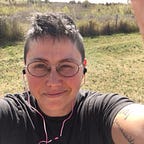Lead By Example: Women of Color led curbside community delays OPD eviction
On the morning of Saturday, November 10th approximately fifty people showed up prepared to support residents in resisting a Notice to Vacate Illegal Encampment. The encampment, Housing and Dignity Village, was established at 2am on the morning of October 27th when community members cleaned up a vacant city plot in the Brookfield neighborhood of East Oakland. “We helped reclaim this public land that’s been vacant for at least two decades,” said Candice Elder, Founder of the East Oakland Collective, a member-based community organizing group. Once the lot was cleared, residents put up tents and infrastructure to shelter 10 unhoused residents, mostly Black and Brown women, and their families.
Residents of Housing and Dignity Village filed a restraining order against the city of Oakland, Mayor Libby Schaaf, and Assistant City Administrator, Joe DeVries; it was temporarily approved by a judge until the case goes to court on Tuesday, November 13th. Some residents of the Housing and Dignity Village and housed community members were prepared to be arrested instead of complying with the eviction if police officers did show up at the eviction, which was scheduled for Saturday morning. As of 3:00 PM Saturday, November 10th police had not come to evict the residents.
The Housing and Dignity Village (HDV) is a sober space that provides shelter and living space for these ten residents, as well as community support such as meals, clothing, medical services, and a garden for the community. They have a fully functioning kitchen, solar lighting, a seating area, composting toilet, tents, and community security. The land is open to neighbors on Monday, Wednesday, Friday, and the weekends. They provide services to housed and unhoused neighbors including meals, a safe space to convene and a place to use the restroom.
With 50 people at hand but no imminent eviction, volunteers and residents painted signs, cooked food, organized common spaces, and built risers to lift residents off the ground. Aiyahnna Johnson, a resident of Housing and Dignity Village and former leader of Occupy Oakland, said the community is fighting the eviction because the city’s approach to curbside communities is “just belittling to anybody who deserves the human rights in this. They’re looking at the money instead of the actual people. And that’s a problem. They don’t care about the resources that they can provide or the help that they could provide.”
Jodii, a community member that uses the Housing and Dignity Village services and is a resident of The Village, said the city should actually be trying to help instead of “looking like they’re helping us with press conferences in front of St. Vincent de Paul Shelter and then selling off our land. Need trumps greed every time.” Benjamin Royer, a wheelchair-user that lives in an encampment in Berkeley, came to Housing and Dignity Village to be in solidarity with residents this morning. “I blank out when they say the word shelter. If they say the word shelter I know it’s a dead end.” He clarified that shelters aren’t safe for him because he can’t defend himself from physical assault or theft because of his wheelchair. He has been assaulted, a victim of theft, and has had police destroy his tent and all his belongings. In February Royer will have been living unsheltered for 3 years.
The lot was filled with community members ready to support Johnson and other Housing and Dignity Village residents in creating the safest, highest quality housing solutions available within this space. Brianna Gilmore, a housed resident of the Fruitvale neighborhood of Oakland, was prepared to be arrested if the city came to clear the lot today. She said she has a responsibility as a housed person and a new resident to hold the city accountable for their inability to provide housing solutions for all residents.
Aiyahnna Johnson is hopeful that Housing and Dignity Village can show Schaaf and other city leaders that the people most impacted by the lack of quality, affordable housing are the best people to develop encampment systems that work, and allocate funds to support them. “So if we get this land we can build and show her what she’s supposed to be doing. Maybe if we lead by example maybe that will change her mind and turn some heads.”
Update: On Tuesday, November 13th Judge Haywood Gilliam extended the restraining order until the next hearing. The hearing is 3pm on Monday, November 26th at the US District Court located at 1301 Clay St. in Oakland.
